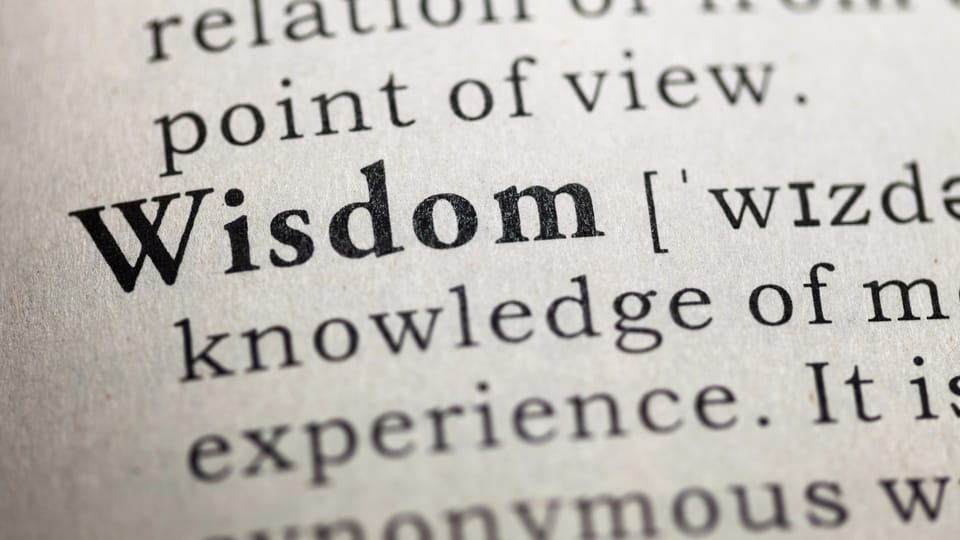Wisdom, Rewards, and Failure (Proverbs 3:1-12)

If you go to Indigo this afternoon, and wander to the self-help section, you're going to find some books that are going to teach you how to live a good life. Here's a sample:
- One book shows how "transcending our ego-based state of consciousness is not only essential to personal happiness, but also the key to ending conflict and suffering throughout the world." It tells us "how to awaken to a new state of consciousness and follow the path to a truly fulfilling existence."
- Another book offers "a five-day jump start that uses the principles in the book in a very specific, directed way to get you a fresh start on the path to optimal wellness."
- Just one other example. Another book gives a step-by-step process that will help us navigate the terrain of our best lives so we can set a new life course
These are all very popular books, and there are more. And if they're not enough, you can get magazines as well that teach you about friendship, how to look hot, how to improve every area of your life that you can think of.
There's a huge demand for wisdom, isn't there? This morning we're going to continue to look at a book of the Bible that offers wisdom so that we know how to live. Wisdom in this book means skill in living, competence in dealing with the realities of life.
And what we're going to see in this passage this morning is completely different than anything we'll find at Chapters. Proverbs 3 gives us three things we need to understand: the path to wisdom, the rewards of wisdom, and then – surprisingly, about failure.
First, let's look at the path to wisdom.
Proverbs 3 tells us how to become wise, how to obtain skill in living. It's different from what you find anywhere else.
In his book The Abolition of Man, C.S. Lewis writes about what sets ancient wisdom apart from some of the wisdom we encounter today:
There is something which unites magic and applied science while separating both from the 'wisdom' of earlier ages. For the wise men of old the cardinal problem had been how to conform the soul to reality, and the solution had been knowledge, self-discipline, and virtue. For magic and applied science alike the problem is how to subdue reality to the wishes of men: the solution is a technique.
If you look at a lot of books and advice today, they're about techniques for you to get what you want. It's about changing the world to match what your soul wants. Proverbs is completely different. It's not about changing the world out there as much as it is about changing us so that our souls match reality.
So this morning's passage gives us some practices or habits that we need to incorporate into our lives so that, over time, we will become wise.
The first practice is Scriptural.
Verse 1 says, "My son, do not forget my teaching, but keep my commands in your heart." The writer talks about his teaching and his commands, which probably refers to the completed book of Proverbs. But it's bigger than that. The word teaching in the original is torah, which is the same word for God's Law, the first five books of the Bible. The writer of Proverbs is urging us to take God's Word, to remember it, and actually to go further than that: to keep them in our heart. The heart in the Bible means the essential you – your mind, emotions, and will. The writer tells us to take the Scriptures and embed them in our lives, almost like the Scriptures become the operating system of our lives.
If you've travelled up the 400 or Highway 69, you've seen these huge rocks on either side of the highway. They're huge. You realize that they've come along with dynamite and blasted a path through the rocks for the road. If you wanted to blast away that rock, you may try exploding the dynamite outside the rock, but it really wouldn't do much. It may sheer some rock off the surface, but you'd never be able to blast your way through that rock. But if you drilled a hole into the center of that rock, and dropped the dynamite deep inside the rock, when that dynamite exploded, the rock would move.
That's exactly what Proverbs tells you to do with God's Word. The Bible will never change you if it's outside of you. But if you put the Bible deep inside your life, at the center of your personality, when God's Word goes off it will move you. Wisdom involves placing God's Word into your heart and absorbing it into your life.
The second practice is about God.
Verse 3 says, "Let love and faithfulness never leave you; bind them around your neck, write them on the tablet of your heart." The two words there – love and faithfulness – would have been instantly known by the student at the time Proverbs was written. They are words that are used to refer to God and his covenant relationship with his people. For instance, Exodus 34:6 says, "The LORD, the LORD, the compassionate and gracious God, slow to anger, abounding in love and faithfulness." The word love there is one of my favorite words in the whole Bible – hesed, which means industrial strength love, love that is unconditional and doesn't give up.
Now is this verse referring to us developing the qualities of love and faithfulness, or is it about internalizing God's love and faithfulness? The answer is yes. It's both of these. The writer is telling us to do more than learn a set of principles or follow a set of techniques. You'll never change by learning five steps to wisdom or three steps to improving your life. You need God's industrial strength love and faithfulness. You need a relationship with God. And when you have it, it will begin to change your life, and the same qualities will begin to show up in your life as well.
The third practice is about ourselves.
One song says, "Oh you can be what you wanna be, See what you wanna see. Believe in yourself, just believe in yourself. You can go where you wanna go, Do what you wanna do. Believe in yourself, just believe in yourself." We're told that the way to improve is to put more confidence in who we are, to believe in ourselves. But Proverbs gives us a different practice to wisdom. Verses 5 to 7 say:
Trust in the LORD with all your heart
and lean not on your own understanding;
in all your ways submit to him,
and he will make your paths straight.
Do not be wise in your own eyes;
fear the LORD and shun evil.
You know what this is telling us? Verse 5 gives us a picture of leaning on something that's unreliable for support. Have you ever grabbed a rail for support, only to find that if you put any wait on it, it would collapse and you'd go tumbling? That's the picture that the writer gives us. When we rely on ourselves and our ability to figure things out, we're putting weight on something that is incapable of bearing that weight, and we'll come crashing down. Later on, Proverbs says that we're worse than fools when we do this. Proverbs 26:12 says, "Do you see people who are wise in their own eyes? There is more hope for fools than for them."
Verse 7 tells us what we have to do in order to be wise. There's a paradox here. It says that we're never wiser than when we recognize our own foolishness, and we're never more foolish than when we think we're wise. You want to know who the wisest people are in this world? It's the ones who don't believe in themselves, who recognize their weaknesses and limitations, are deeply, continuously, and joyfully repentant, and who are depending on God for wisdom.
The fourth and final practice is about money.
If you want to make people feel nervous, talk about money. I think the writer here gets practical in this area because he knows that our wallets are awfully close to our hearts. He says in verse 9, "Honor the LORD with your wealth, with the firstfruits of all your crops." The writer tells us to honor God with our wealth by giving our money, not when we're done paying our expenses but right off the top. You won't get this anywhere else. Nobody will tell you that the way to wisdom is to give your money away. It's completely countercultural, and yet it's a theme all throughout Scripture.
This is why we need Proverbs. You won't find a book at Chapters or Indigo that tells you to live this way. The way to live well is not through a set of techniques that makes life into what you want it to be. Instead, it's a set of practices that brings your soul in line with reality.
If you want to be wise, this is the path to wisdom. The way to live well is to embed Scripture into your life, to enter into relationship with God so his qualities become yours, to humbly repent before him, to not trust yourself, and then to give your money away so it doesn't become an idol in your life. You won't find this path to wisdom anywhere else, and it's why all the other paths ultimately disappoint.
But this passage doesn't just give the path to wisdom, it also gives the rewards.
Let's look at these rewards.
What happens if you incorporate these practices into your life and become wise? You'll see a set of rewards that are listed in this passage:
- a long and prosperous life in verse 2
- favor with God and other people in verse 4
- a smooth path through life in verse 6
- health and healing in verse 8
- and riches in verse 10
Why should we expect these rewards if we live well? Because God has structured the world so that foolish living usually results in bad things happening. Making bad decisions usually leads to bad consequences. And wise living usually leads to good things happening, all things being equal. Those who acquire the skill of living well can usually expect a better life than those who live foolishly.
But it's here that as I read through this chapter that I began to struggle. Does anyone here know foolish people who are living very well, and people who seem to be wise who have had nothing but problems in their life? You even look in Scripture, and you realize that while wisdom usually leads to a better life than foolishness, there are all kinds of exceptions.
You only have to look at some of the other wisdom literature to realize this. Job suffers horribly, and not because he deserved it. Psalm 73 is the story of someone who almost lost his faith when he saw the wicked doing so well while the righteous suffer. Solomon himself says in Ecclesiastes, "There is something else meaningless that occurs on earth: the righteous who get what the wicked deserve, and the wicked who get what the righteous deserve. This too, I say, is meaningless" (Ecclesiastes 8:14). When we look at the wisdom literature as a whole, we recognize that while it's generally true that living wisely means living well, there are many cases of people who live well who don't prosper the way that we would expect.
This tells us that while there are rewards for living wisely, life is complex. But even this passage acknowledges that life will not all be blue skies and happy faces.
If you read verses 1 to 10, it looks as if it's going to all good. You think that we're going to live lives of wisdom, and then God will reward us. But then we get to verses 11 and 12, and it's something we don't expect at all:
My son, do not despise the LORD's discipline,
and do not resent his rebuke,
because the LORD disciplines those he loves,
as a father the son he delights in.
And it's here that we see not only the path to wisdom, and the rewards of wisdom, but something much deeper:
What happens when we fail
Imagine this morning that I had a check for one million dollars made out in your name, dated May 1. And suppose I told you that this check would be your reward for living well for the rest of the month. But suppose I said that I would be following you, watching you very carefully, and the first time I saw you raise your voice, or lose your temper, or go even a little bit over the speed limit, or do anything wrong, I would rip up the check and you would lose the million dollars. How would you feel? You would feel incredible pressure. It would crush you. And you would never be able to do it. Every one here would forfeit the million dollars, because nobody here can measure up to that impossible standard.
Verses 1 to 10 give us what it will take for us to obtain wisdom, and what we'll generally receive if we succeed. But what happens when we don't measure up? If you take verses 1 to 10 alone, it will produce incredible pressure in your life. It will crush you, because you'll never be able to measure up to what wisdom demands of you.
But in verses 11 and 12, we see that God knows this. We see the recognition that it won't be all blue skies in your life. But neither will failure mean that God will abandon you. You will fail, and you will be disciplined and rebuked, and the discipline and rebuke won't be a sign of God's absence from your life. In fact, it will be a sign of his presence and his love.
You see, in verses 11 and 12 you encounter two things that we desperately need from God: his mercy and his justice. We need his mercy because if God didn't show us mercy we would be crushed. But we also need his justice because the last thing we need is an unjust God. There is lots of injustice in the world, and if God wasn't just, we would be completely without hope. So in these verses we have God's mercy: he doesn't write us off when we fail. But we also have his justice: he doesn't ignore our sins and our failures. He deals with them.
George MacDonald, a Scottish author and pastor who lived over a hundred years ago, said, "I believe that justice and mercy are simply one and the same thing; without justice to the full there can be no mercy, and without mercy to the full there can be no justice." We need not only a path to wisdom, along with its rewards. We need a God who is just, but who doesn't write us off when we fail.
The message of the Bible is not, "Here's a set of principles you need to follow, and if you do these you will live." The message of the Bible is that God has shown us how to live, and we have failed. Every one of us have failed. But God has done something about it.
Proverbs tells us that God's mercy and justice meet when we're disciplined by God, but do you know where you see God's mercy and justice together most powerfully? At the cross. At the cross, the demands of God's justice were fully satisfied, and at the same time God showed mercy and grace to everyone who has sinned.
If you don't make it to the cross, if you read a few verses in Proverbs…without detecting how these sentences connect to the blood-stained beam of wood…you'll make your Bible reading and your relationship with God about your performance rather than about Jesus' performance. You'll gravitate away from the gospel and towards religion. Anxiety and fear will take the place of confidence, joy, and rest. Legalism will replace freedom. If your eyes don't catch a glimpse of the cross as you turn the pages of Scripture, you're likely to spend much of your day staring at yourself, wallowing in endless introspection, rather than staring at your Savior, delighting in his costly love.
Let's come to the table and delight not in our own performance, but in the blood-stained cross of our Savior. Let's look to him and delight in his costly love.





